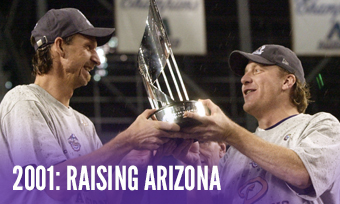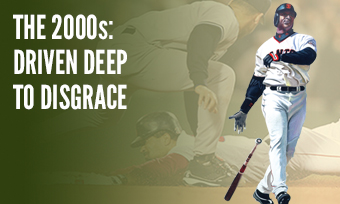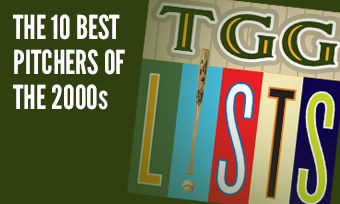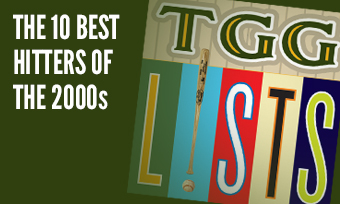The Yearly Reader
Leaders and Honors, 2001
Our list of baseball’s top 10 hitters and pitchers in both the American League and National League for the 2001 baseball season, as well as the awards and honors given to the game’s top achievers of the year.
The National League’s Top 10 Hitters, 2001
Bold type in brick red indicates league leader.
1. Barry Bonds, San Francisco
Key Numbers: .328 average, 129 runs, 32 doubles, 73 home runs, 137 RBIs, 177 walks, 35 intentional walks, 13 stolen bases, .515 on-base percentage, .863 slugging percentage.
Seventy-three home runs wasn’t the only Barry Bonds statistic to drop jaws; he assembled the highest-ever slugging percentage to break Babe Ruth’s 80-year old mark.
2. Sammy Sosa, Chicago
Key Numbers: .328 average, 146 runs, 189 hits, 34 doubles, 5 triples, 64 home runs, 160 RBIs, 116 walks, 37 intentional walks.
Sosa became the first player to hit 60 homers three times—and in each case, he finished second to someone else. His 160 RBIs were the most by a National Leaguer since Chuck Klein in 1930.
3. Todd Helton, Colorado
Key Numbers: .336 average, 132 runs, 197 hits, 54 doubles, 49 home runs, 146 RBIs, 98 walks.
Helton became the first player to record 400 total bases and 100 extra-base hits in consecutive seasons.
4. Luis Gonzalez, Arizona
Key Numbers: 162 games, .325 average, 128 runs, 198 hits, 36 doubles, 7 triples, 57 home runs, 142 RBIs, 100 walks, 14 hit-by-pitches.
After setting one personal record with 26 homers in 1999, followed by another with 31 in 2000, Gonzalez again reset the bar in 2001—on June 23. (He would never hit more than 28 in any of his last seven years.)
5. Larry Walker, Colorado
Key Numbers: .350 average, 107 runs, 174 hits, 35 doubles, 38 home runs, 123 RBIs, 14 hit-by-pitches, 14 stolen bases.
The future Hall of Famer, who would hit .381 for his career at Coors Field, topped that in 2001 with a Ted Williams-esque .406 figure.
6. Lance Berkman, Houston
Key Numbers: .331 average, 110 runs, 191 hits, 55 doubles, 5 triples, 34 home runs, 126 RBIs, 92 walks, 13 hit-by-pitches.
Alphabetically as well as by performance, the young Astro complemented the elder Killer B drone of Jeff Bagwell and Craig Biggio.
7. Shawn Green, Los Angeles
Key Numbers: .297 average, 121 runs, 184 hits, 31 doubles, 49 home runs, 125 RBIs, 20 stolen bases.
Green set a Dodgers franchise record with 49 taters; 30 of them were belted away from Dodger Stadium.
8. Albert Pujols, St. Louis
Key Numbers: .329 average, 112 runs, 194 hits, 47 doubles, 37 home runs, 130 RBIs, 21 grounded into double plays.
While everyone else was paying attention to Barry Bonds, Pujols quietly put together one of baseball’s most impressive rookie campaigns.
9. Cliff Floyd, Florida
Key Numbers: .317 average, 123 runs, 176 hits, 44 doubles, 31 home runs, 103 RBIs, 19 intentional walks, 10 hit-by-pitches, 18 stolen bases.
Floyd’s ascension to All-Star status was well-timed, given that free agency was a year away. (Of course, the penny-pinching Marlins would deal him midway through 2002 rather than lose him for nothing.)
10. Jeff Bagwell, Houston
Key Numbers: .288 average, 126 runs, 173 hits, 43 doubles, 39 home runs, 130 RBIs, 106 walks, 11 stolen bases, 20 grounded into double plays.
A prodigious reign reached its coda as Bagwell ended a six-year run batting .301 with an annual average of 39 home runs, 126 RBIs, 128 runs and 122 walks.
The American League’s Top 10 Hitters, 2001
1. Jason Giambi, Oakland
Key Numbers: .342 average, 109 runs, 178 hits, 47 doubles, 38 home runs, 120 RBIs, 129 walks, 24 intentional walks, 13 hit-by-pitches, .477 on-base percentage, .660 slugging percentage.
Across the bay from Barry Bonds, fellow BALCO believer Giambi downed (or perhaps injected) the cocktail of choice toward a big-time contract with the Yankees—forcing Oakland GM Billy Beane to embrace the low-budget Moneyball doctrine in order to succeed without him.
2. Alex Rodriguez, Texas
Key Numbers: 162 games, .318 average, 133 runs, 201 hits, 34 doubles, 52 home runs, 135 RBIs, 16 hit-by-pitches, 18 stolen bases.
A-Rod came to Texas because he wanted to win, but his prodigious contract would curb the mid-market Rangers’ ability to build around him; thus the All-World shortstop could only ride the Rangers to last place in spite of a monster effort.
3. Bret Boone, Seattle
Key Numbers: .331 average, 118 runs, 206 hits, 37 doubles, 37 home runs, 141 RBIs.
Many miles and 43 victories to the northwest in Seattle, A-Rod’s former teammates heckled “wish you were here” with the help of first-year Mariner Boone—who entered 2001 with a career .255 average and limited power.
4. Jim Thome, Cleveland
Key Numbers: .291 average, 101 runs, 26 doubles, 49 home runs, 124 RBIs, 111 walks, 185 strikeouts.
Ten of Thome’s home runs were drilled over 18 interleague games; 30 were hit at home, a personal record he’d matched the following year—his last full season at Cleveland.
5. Roberto Alomar, Cleveland
Key Numbers: .336 average, 113 runs, 193 hits, 34 doubles, 12 triples, 20 home runs, 100 RBIs, 30 stolen bases.
With this being his final year at Cleveland, Alomar had one of his most complete set of numbers; a postseason trade to the Mets would send him into an instant funk from which he’d never recover.
6. Manny Ramirez, Boston
Key Numbers: .306 average, 93 runs, 33 doubles, 41 home runs, 125 RBIs, 81 walks, 25 intentional walks.
Manny began his tumultuous (but highly prodigious) tenure at Fenway Park by absorbing far more intentional walks than with the Indians, as David Ortiz was still a few years away from arriving to give him protection.
7. Juan Gonzalez, Cleveland
Key Numbers: 140 games, .325 average, 97 runs, 173 hits, 34 doubles, 35 home runs, 140 RBIs, 16 sacrifice flies.
After a year of discontent living among the wide-open spaces of Comerica Park, Gonzalez was put back in the right frame of mind playing at relatively cozy Jacobs Field in Cleveland.
8. Ichiro Suzuki, Seattle
Key Numbers: .350 average, 692 at-bats, 127 runs, 242 hits, 34 doubles, 8 triples, 8 home runs, 69 RBIs, 56 stolen bases.
Suzuki broke a number of first-year records (including the mark for hits), though given his productive past in Japan it seemed rather technical to label him a rookie. He denied Jason Giambi a second straight AL MVP, edging him by a 289-281 count.
9. Rafael Palmeiro, Texas
Key Numbers: .273 average, 98 runs, 33 doubles, 47 home runs, 123 RBIs, 101 walks.
Another year, another 40 homers (give or take a few) from Palmeiro, who was starting to make it look rather ordinary at Arlington.
10. Carlos Beltran, Kansas City
Key Numbers: .306 average, 106 runs, 189 hits, 32 doubles, 12 triples, 24 home runs, 101 RBIs, 31 stolen bases, 1 caught stealing.
The 24-year-old switch-hitter followed up a bad sophomore effort from 2000 with a superior junior showing, again leaving Royals fans to wonder why their team had so much strong young hitting talent, yet was still buried in the standings.
The National League’s Top 10 Pitchers, 2001
1. Randy Johnson, Arizona
Key Numbers: 2.49 ERA, 21 wins, 6 losses, .778 win percentage, 34 starts, 249 innings, 372 strikeouts, 18 hit-by-pitches, 19 stolen bases allowed, 19 caught stealing/picked off.
When you add in the postseason numbers, the Big Unit struck out 421 batters over 290.1 innings in 2001. He’s the first pitcher to rack up at least 300 in four straight years.
2. Curt Schilling, Arizona
Key Numbers: 2.99 ERA. 22 wins, 6 losses, 6 complete games, .786 win percentage, 35 starts, 256.2 innings, 39 walks, 293 strikeouts, 4 stolen bases allowed, 11 caught stealing/picked off.
The hardnosed Schilling played Don Drysdale to Randy Johnson’s flamethrowing Sandy Koufax.
3. Matt Morris, St. Louis
Key Numbers: 3.17 ERA, 22 wins, 8 losses, .733 win percentage, 34 starts, 216 innings, 13 hit-by-pitches.
Morris realized his highly-touted potential after arm problems nearly killed his career in 1999.
4. Greg Maddux, Atlanta
Key Numbers: 3.05 ERA, 17 wins, 11 losses, 3 shutouts, 34 starts, 233 innings, 27 walks, 10 intentional walks, 24 stolen bases allowed, 16 caught stealing/picked off.
A footnote on Greg Maddux’s 72.1-inning streak without a walk, a record for a starting pitcher: The walk that ended the streak was an intentional pass. Mad Dog actually threw 87 straight innings without conceding one of the didn’t-mean-to variety.
5. Russ Ortiz, San Francisco
Key Numbers: 3.29 ERA, 17 wins, 9 losses, 33 starts, 218.2 innings, 20 grounded into double plays.
Like most pitchers, it took a while for Ortiz to figure out the quirks of the Giants’ new ballpark (then named Pac Bell Park) and have it play to his advantage. As such, his home ERA was a sterling 2.49, down from 4.21 in 2000.
6. John Burkett, Atlanta
Key Numbers: 3.04 ERA, 12 wins, 12 losses, 34 starts, 219.1 innings.
Seven years, a 68-73 record and a 4.68 ERA since winning 20 for the 1993 Giants, Burkett briefly got himself back on track even if his record didn’t show it.
7. Armando Benitez, New York
Key Numbers: 3.77 ERA, 6 wins, 4 losses, 43 saves, 3 blown saves, 73 appearances, 76.1 innings, 11 stolen bases allowed.
As overbearing in appearance as he was on opponents, Benitez didn’t exactly light the world on fire with his ERA, but he still got the job done far more than not.
8. Jon Lieber, Chicago
Key Numbers: 3.80 ERA, 20 wins, 6 losses, .769 win percentage, 34 starts, 232.1 innings, 41 walks.
Lieber became the first 20-game winner for the Cubs since Greg Maddux in 1992 with a workhorse-like effort; he’d pay for it the following year by undergoing Tommy John surgery.
9. Javier Vazquez, Montreal
Key Numbers: 3.43 ERA, 16 wins, 11 losses, 32 starts, 3 shutouts, 223 innings, 44 walks, 20 grounded into double plays.
One of the more consistent (if not dominant) pitchers of the 2000s, Vazquez put forth one of nine 200-inning campaigns during the decade. (The one in which he didn’t reach 200? The 2004 season, when he totaled 198.)
10. Robb Nen, San Francisco
Key Numbers: 3.04 ERA, 4 wins, 5 losses, 45 saves, 7 blown saves, 79 appearances, 77 innings, 17 stolen bases allowed.
The fourth-year Giants closer was worked—perhaps overworked—into a career-high totals in appearances and saves.
The American League’s Top 10 Pitchers, 2001
1. Mark Mulder, Oakland
Key Numbers: 3.45 ERA, 21 wins, 8 losses, .724 win percentage, 34 starts, 4 shutouts, 229.1 innings, 51 walks, 18 stolen bases allowed, 14 caught stealing/picked off, 26 grounded into double plays.
After struggling with a 5.44 ERA as a rookie, Mulder truly arrived on the heels of Tim Hudson to give the A’s their second breakout performance in as many years.
2. Freddy Garcia, Seattle
Key Numbers: 3.05 ERA, 18 wins, 6 losses, .750 win percentage, 34 starts, 238.2 innings, 23 grounded into double plays.
The Venezuelan-born Garcia—whose presence in Seattle would soon encourage teenage compatriot Felix Hernandez to sign with the Mariners—authored the highest ERA by a league leader since Early Wynn in 1950.
3. Mike Mussina, New York
Key Numbers: 3.15 ERA, 17 wins, 11 losses, 34 starts, 228.2 innings, 42 walks, 9 stolen bases allowed, 15 caught stealing/picked off.
Never one for the spotlight, Mussina began a relaxing new chapter at Yankee Stadium as he shared starting responsibilities with the likes of Roger Clemens and Andy Pettitte.
4. Mariano Rivera, New York
Key Numbers: 2.34 ERA, 4 wins, 6 losses, 50 saves, 7 blown saves, 71 appearances, 80.2 innings, 12 walks.
Thanks in large part to the three aforementioned Yankee aces, nobody was handed more leads in the ninth than Mariano Rivera—who made good with a career-high 50 saves.
5. Jamie Moyer, Seattle
Key Numbers: 3.43 ERA, 20 wins, 6 losses, .769 win percentage, 33 starts, 209.2 innings, 44 walks, 10 hit-by-pitches.
In his 16th major league season at age 38, Moyer won 20 games for the first time—and ran his record since joining the Mariners in 1996 to 85-40.
6. Tim Hudson, Oakland
Key Numbers: 3.37 ERA, 18 wins, 9 losses, 35 starts, 235 innings, 24 stolen bases allowed.
A winning pitcher from the moment he stepped onto the ballfield, the unimposing (6’0”, 160 pounds) but sly Hudson ran his three-year mark in Oakland to 49-17.
7. Keith Foulke, Chicago
Key Numbers: 2.33 ERA, 4 wins, 9 losses, 42 saves, 3 blown saves, 72 appearances, 81 innings.
Sometimes the closer’s mindset is to get the ball with the short lead; perhaps that explains why Foulke lost seven games after entering a tied game.
8. Mark Buehrle, Chicago
Key Numbers: 3.29 ERA, 16 wins, 8 losses, 32 starts, 221.1 innings, 48 walks, 6 stolen bases allowed, 11 caught stealing/picked off, 23 grounded into double plays.
Rising from the ashes of an injury-ravaged 2000 White Sox rotation, Buehrle emerged as a long-term alternative with his first of 15 straight years winning in double-figures.
9. Bob Wickman, Cleveland
Key Numbers: 2.39 ERA, 5 wins, 0 losses, 32 saves, 3 blown saves, 70 appearances, 67.2 innings, 14 walks.
Wickman’s standing as Cleveland closer stood firm, even as a sore elbow and the acquisition of controversial former Braves reliever John Rocker threatened to demote him to set-up duty.
10. Joe Mays, Minnesota
Key Numbers: 3.16 ERA, 17 wins, 13 losses, 34 starts, 233.2 innings, 11 wild pitches.
A one-year wonder in the Twin Cities, Mays thrived amid a seven-year career in which he otherwise was 31-57 with a 5.62 ERA.









